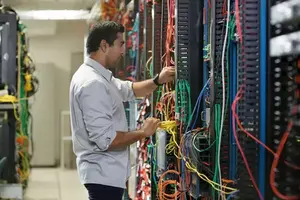Networking Course
In the fast-evolving landscape of technology, networking serves as the backbone, facilitating seamless communication and data transfer. Our Networking Courses are meticulously designed to empower individuals with the skills and knowledge needed to navigate the intricacies of modern networking. Whether you are a seasoned IT professional looking to enhance your expertise or a beginner eager to step into networks, our comprehensive courses cater to all proficiency levels.
Master the Fundamentals – Building a Strong Foundation
In this foundational module, participants delve into networking basics, understanding the core principles governing data transmission and connectivity. From grasping the essentials of protocols and network architecture to hands-on exercises in setting up local area networks (LANs) and wide area networks (WANs), this section ensures learners establish a robust foundation for more advanced topics.
Topics Covered:
- Introduction to Networking Concepts
- OSI Model Demystified
- TCP/IP Protocols Unveiled
- Practical LAN and WAN Setup
Advanced Networking – Navigating the Complexity
Building upon the fundamentals, our advanced courses are tailored to equip individuals with the skills to manage complex networks efficiently. Participants explore network security, cloud computing, and virtualization, gaining insights into industry trends and emerging technologies.
Topics Covered:
- Network Security: Threats and Countermeasures
- Cloud Computing in Networking
- Virtualization Technologies
- Software-Defined Networking (SDN)
Frequently Asked Questions (FAQs):
Q1: What background knowledge is required to enroll in the Networking Courses?
A1: Our courses are designed to cater to a diverse audience. While a basic understanding of IT concepts can be beneficial, beginners are also welcome. We offer introductory modules to help participants build a strong foundation before delving into more advanced topics.
Q2: How hands-on are the courses?
A2: Hands-on experience is a crucial aspect of our Networking Courses. We believe in a practical approach, and participants will engage in real-world scenarios, including setting up networks, troubleshooting, and implementing security measures. Our labs and simulations provide a realistic environment for skill development.
Q3: Are the courses up-to-date with the latest industry trends?
A3: Absolutely. We understand the importance of staying current in the dynamic field of networking. Our courses are regularly updated to incorporate the latest advancements, ensuring participants are well-versed in cutting-edge technologies and industry best practices.
Q4: What certification will I receive upon completion?
A4: Participants who complete our Networking Courses will receive a certification acknowledging their proficiency. Our certifications are recognized in the industry and testify to the skills acquired during the program.
Q5: Can the courses be taken online, or are they only available in person?
A5: We offer the flexibility of both online and in-person learning. Participants can choose the mode that best suits their schedule and preferences. Our online platform provides an immersive virtual classroom experience, ensuring that participants receive the same quality of education regardless of their chosen learning mode.
Join Burraq Institute to unlock the potential of networking. Enroll in our Networking Courses and embark on a path to becoming a proficient and sought-after networking professional.
Networking Course Details
- Computer Networks and the Internet
- Application Layer
- Socket Programming (with UDP, TCP)
- Wireless and Mobile Networks
- The Network Layer
- Multimedia Networking
- Security in Computer Networks
- What is the Internet?
- The Network Edge
- The Network Core
- Delay, Loss, and Throughput in Packet-Switched Networks
- Internet Architecture Overview
- The Web and HTTP
- FTP
- DNS
- Transport Layer
- UDP
- TCP
- Forwarding and Routing
- Network Service Models
- Routers
- The Internet Protocol (IP)
- Routing Algorithms:
- The Link-State (LS) Routing Algorithm
- The Distance Vector (DV) Routing Algorithm
- The Link Layer
- Links, Access Networks, and LANs:
- Switched LANs: Link-Layer Addressing and ARP
- Ethernet
- Link-Layer Switches
- VLANs
- WiFi:802.11 Wireless LANs
- Multimedia Networking Applications
- Streaming Stored Video
- Network Support for Multimedia
- Messaging Integrity

Networking Course
- Rs 30,000/-
- Course Duration 3 Months
- Online Session
- On Campus Lecture + Practical
- Video Lecture Available
- Urdu & English
- 24/7 Support
